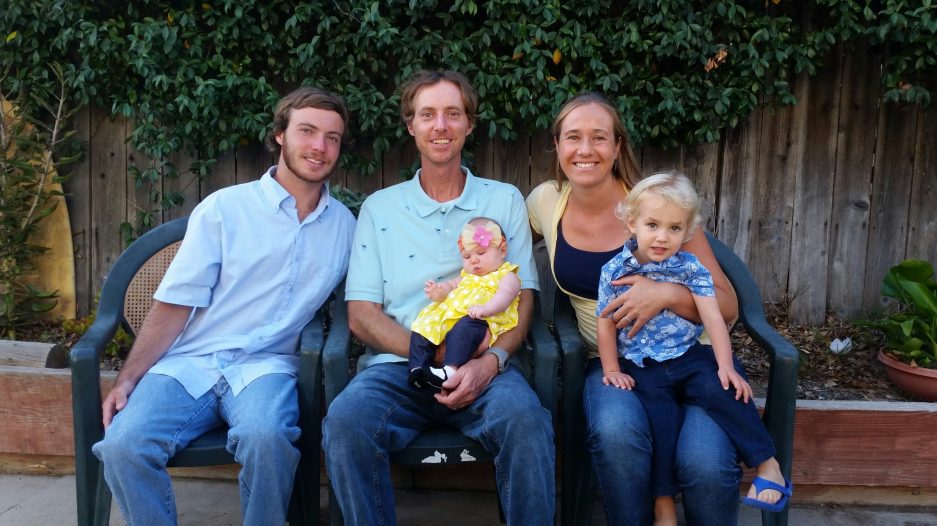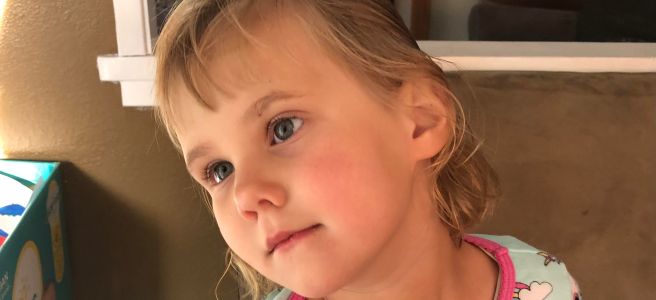Tate was just over two years old when Coral was born. As he made friends at preschool, play dates were planned. I’d load Tate and Coral into the car and we’d go meet his new friends at the park. It always seemed like Tate’s friends had younger sisters similar in age to Coral.
As the play date began and the kids (including the siblings) ran off to the playground to play, Coral remained with me. This moment often felt uncomfortable and awkward, as the other parents realized Coral was not able to run off independently with the other kids. To address the situation quickly, I’d usually say something like, “Coral’s not walking yet because she has a rare chromosomal duplication. She has special needs.”
I used the term “special needs” at the time because that’s what I knew. I thought that was the best way to say it—softer, less direct, kinder, and more thoughtful. I thought using the term “special needs” gave Coral space to be separate from her disability.
Now I see that “special needs” is an inaccurate term. It conveys the sense that what Coral needs to live is different from what other kids need. This is untrue. Her needs have never been special; she needs to eat, to play, to be safe and to communicate (among many other things). The only difference is in what she requires to access those needs in the world.
Using the term “special needs” also ignores the disability itself, seemingly to separate the person from the disability. This runs counter to the entire disability rights movement.
Additionally, the term “special needs” is becoming a dysphemism (substituting an unpleasant or harsh term for a more neutral one). One day I was waiting to check-in at Tate’s school to volunteer at his STEAM day. A group of three people was ahead of me in line. One of the ladies signed on the wrong line and started to laugh while saying, “I guess I’m handicapped.” Everyone laughed (including the school staff). Then she said, “I’m special,” sarcastically emphasizing the word special. More laughter from everyone.
Over the past 6 years of this parenting journey, I have started to identify my own ableism; these are the perceptions and stereotypes that I believe to be true about disabled people. Some of these perceptions are so deeply embedded in my subconscious, it has taken years to even recognize them. I call them my onion skin layers. I’m always pulling them off, sometimes one by one and other times a few at a time. As the layers come off, I more clearly see the intersection between Coral, disability, parenting and my own ableism. It’s humbling. It’s embarrassing at times to realize what I believed and felt about disability. It’s all part of the journey.
Along this journey, I finally got to a place where I heard (and listened to) the voices of autistic self-advocates and others within the disability community. When I realized their language preferences (one of those being to use the word disabled), I began to align my words with their preferences.
In the process of better aligning with the preferred language of the disability community, I began to align in other ways, too. Today I look more closely at the therapies we choose for Coral, the goals of those different therapies and the amount of time she spends in therapy versus recreational activities. I also question how much society asks Coral to bend towards its expectations without ever reciprocating the effort. I presume competence and more frequently catch myself when I don’t.
Though Coral is young right now and it could be easy to ignore the disability community in exchange for only doing what “I think is best for her”, I know she will not be young forever. One day (before I know it) she will be a disabled adult. As Coral grows bigger (and is no longer “a cute kid”), I want society to address its ableism. I hope society chooses to accommodate her needs and to give her access to what she needs to live her life.
The disability community is actively working to remove barriers to access for disabled individuals. I choose to be an ally to this community, Coral’s community.
To be an ally, I have to listen. The consequences of not listening are far too great, both now and in the future.
Society likes to paint disability in neat cliches framed within the disguise of ableism.
I’m not the “super hero mom” pushing through the “burden of having a disabled daughter.”
I’m not the “special parent God chose for a special child.”
Coral does not “suffer from autism.”
She is not “an inspiration” for living her life each day, and she does not “overcome her disability” when she achieves something.
Coral’s disability is woven into her identity. Every aspect of how she experiences the world is related to her disability. There never was a non-disabled Coral. From conception, Coral had 47 chromosomes. She has always been exactly who she is.
When I say Coral is disabled, I am affirming her right to be exactly as she is. I am listening to autistic self-advocates and other disabled individuals. I am recognizing that I grew up as part of the non-disabled culture and that (even though my daughter is disabled) I do not personally know disability culture. To learn about it, I must listen.
As I listen and learn more, I will keep peeling my onion skin layers away.
And I’ll continue to call my daughter disabled.
But don’t take my word for it. It’s better if you just listen to the disability community. And here’s a few people to get you started.
Jordyn Zimmerman: nonspeaking autistic self-advocate, featured in the documentary “This Is Not About Me” https://thisisnotaboutme.film/
Niko Boskovic: autistic blogger from Portland, Oregon. He identifies as low speaking and uses assistive technology to communicate.
“Having a disability is something that seems to invite people’s unsolicited comments and opinions, and if there’s one thing non-disabled people can do, it is to defer to disabled voices first, and then wrap the experiences of parents and professionals throughout that narrative.” – Niko Boskovic
https://www.facebook.com/nikoboskovicPDX
Samuel Habib– Directs and is featured in My Disability Roadmap, disability advocate
https://likerightnowfilms.com/productions/details/3356/My-Disability-Roadmap
Autistic Self Advocacy Network https://autisticadvocacy.org/

